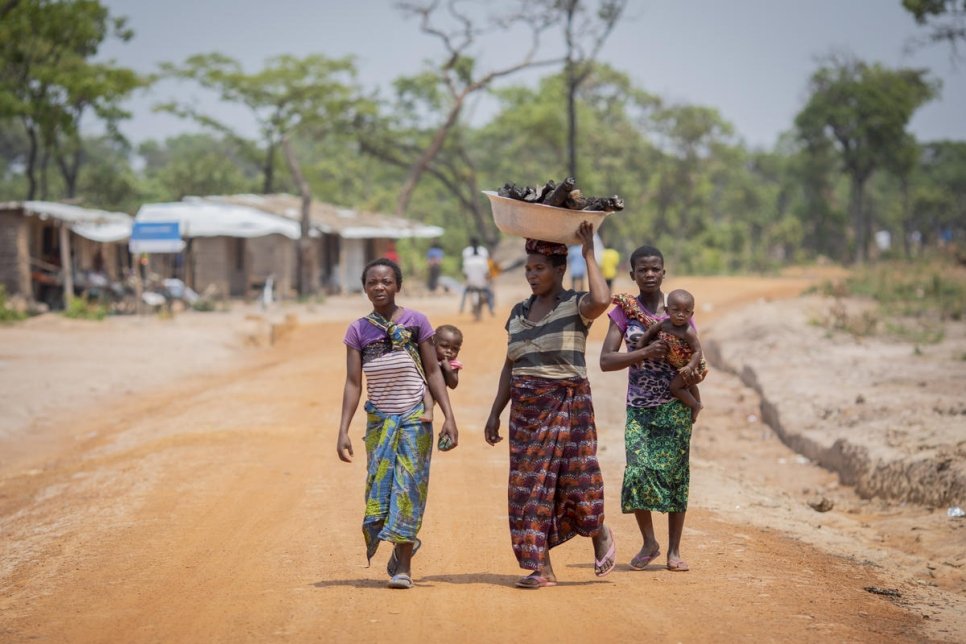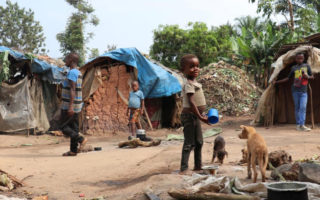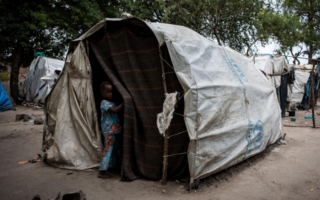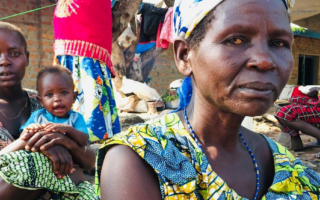
Refugee women from the Democratic Republic of the Congo walk towards the market in Mantapala Settlement, Zambia. © UNHCR/Will Swanson
This is a summary of what was said by UNHCR spokesperson Babar Baloch – to whom quoted text may be attributed – at today’s press briefing at the Palais des Nations in Geneva.
UNHCR, the UN Refugee Agency, and its partners are urgently appealing for US$621 million to support refugees from the Democratic Republic of the Congo (DRC) who have sought safety in neighbouring countries as well as to assist hosting communities.
The DRC Regional Refugee Response Plan (RRRP) 2020-2021 launched today by UNHCR and its partners covers humanitarian activities for 66 organizations and seeks to provide immediate protection and humanitarian assistance to refugees as well as help to rebuild lives in the surrounding countries of asylum.
Uganda currently hosts the majority of Congolese refugees with nearly 400,000 people. Others are in Burundi (over 84,000), Rwanda and Tanzania (more than 75,000 each), Zambia (50,000), Angola (23,000) and the Republic of Congo (21,000).
The situation in DRC remains one of the most complex and long-standing humanitarian crises in Africa. Urgent resources are needed to support countries in the Southern Africa and the Great Lakes regions that host more than 900,000 Congolese refugees and asylum-seekers. DRC refugees are seeking safety in locations where hosting communities are already under pressure with meagre resources.
Although a peaceful transition of power followed the presidential elections in December 2018, concerns remain over the deterioration of the humanitarian and security situations, mainly in the eastern part of the country. On-going armed conflicts roiling much of eastern DRC in the past years, as well as inter-communal violence, continue to uproot Congolese both internally and across the nation’s borders.
Recurrent violent attacks have resulted in tragic loss of human lives and destruction of communities. Eastern parts of the country are witnessing worsening security situations with rampant targeting of civilians while frequent violations of human rights continue to be perpetrated by various armed actors.
DR Congo has more than five million internally displaced people in the country, with some who have been repeatedly displaced. More than two million people have been newly displaced in North and South Kivu, as well as Ituri provinces in the last 18 months. A separate Humanitarian Response Plan for DRC itself was launched recently targeting some 8.1 million people in need inside the country. The country also continues to host over 500,000 refugees from Burundi, the Central African Republic, Rwanda and South Sudan, who fled their countries in search of international protection.
As a result of violence, tens of thousands of new refugees have fled across borders since the beginning of 2019. Although countries in the Southern and Great Lakes regions of Africa generously host nearly a million Congolese refugees and asylum-seekers, resources have been decreasing in recent years and do not adequately meet protection, shelter, food security, health and other basic needs or minimum humanitarian standards. In many countries of asylum, refugee settlements and camps are already at full capacity. Support for livelihood interventions are limited, prolonging refugees’ dependence on humanitarian assistance.
The 2019 Regional Refugee Response Plan of US$720 million for the DRC situation was just 22 per cent funded.
For more information on this topic, please contact:
- In Pretoria, Helene Caux, caux@unhcr.org, + 27 82 376 5190
- In Nairobi, Dana Hughes, hughes@unhcr.org, +254 733 440536
- In Kinshasa, Johannes Van Gemund, gemund@unhcr.org, +243 817 009 484
- In Geneva, Babar Baloch, baloch@unhcr.org, + 41 79 513 95 49
Originally published by UNHCR on 06 March 2020





